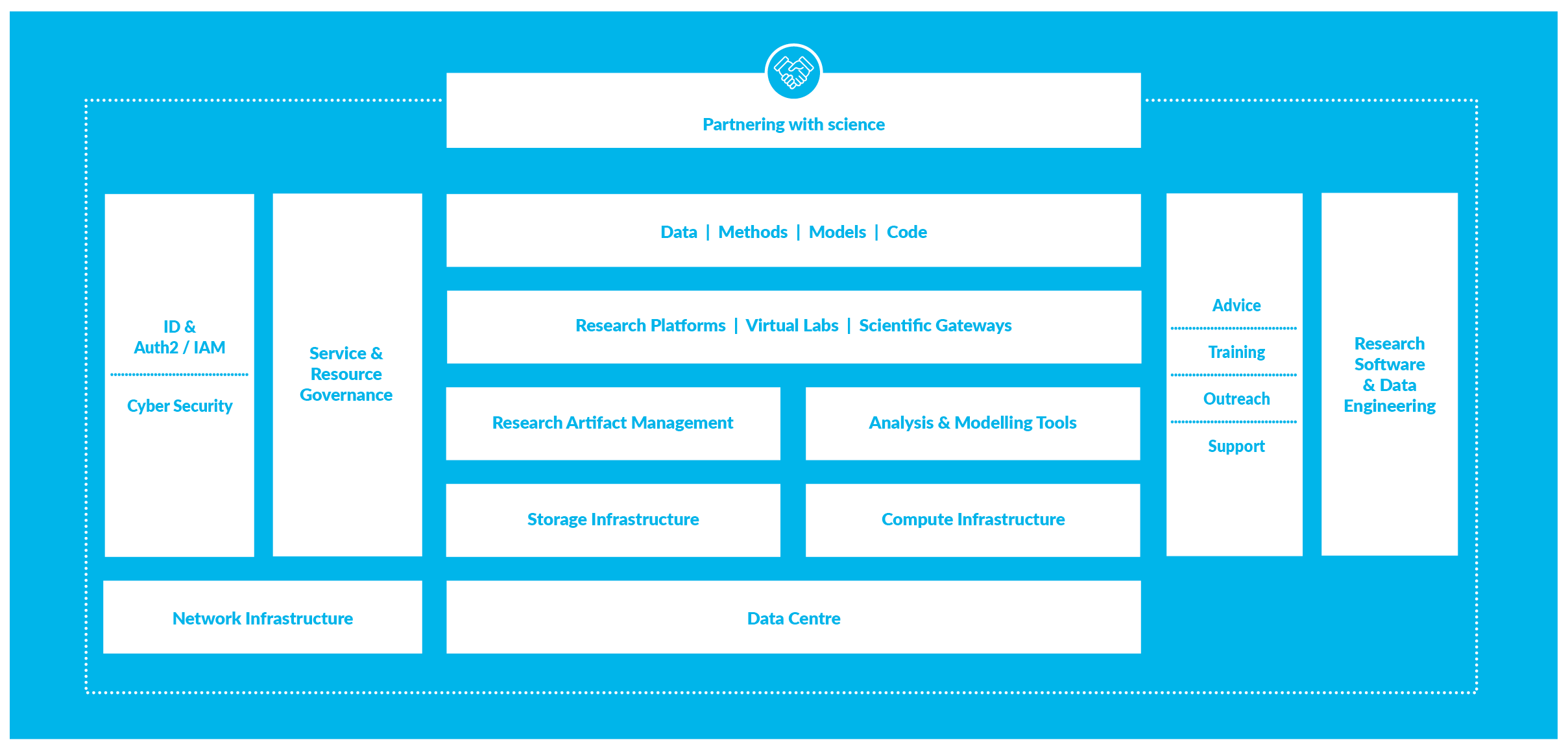Make fit-for-purpose investments aligned with sector needs
NeSI Futures
Over 2018, NeSI has carried out a range of activities to inform its strategic plans, including a researcher consultation, an international benchmark study, a survey of its migration to its new infrastructure, and a review of its training activities.
The researcher consultation involved interviews with 26 leading researchers from New Zealand from across disciplines and institutions. These discussions presented areas of strategic aspiration and risk for researchers over the next 5+ years, covering the lifetime of the proposed investment.
An international benchmarking study was also undertaken in 2018, exploring both the “what” and “how” of eResearch. This work helped define the components of eResearch ecosystems found around the world, describing how they deliver those services, and identifying best practices relevant to the New Zealand eResearch community.
A national eResearch ecosystem

“The work on this project would not be possible without NeSI. The GPU capabilities at NeSI are especially valuable as they accelerate our calculations by about a factor of 10 and we see this becoming more important in the future.”
Blair Blakie, University of Otago
NeSI 3 Investment case 2019-2026
In relationship with the NeSI futures work, in 2018 NeSI began preparing an investment case to seek approval for the Crown to further invest in NeSI from 2019 through to 2026. The case is due for completion in the first half of 2019. NeSI performed well during its first seven years as assessed by MBIE through an external evaluation in 2017. Across 2018, NeSI undertook a course of actions aligned with the recommendations from that review, concluding with forming its longer term strategy which will be outlined in the final investment case.
The investment case is for NeSI’s third investment period (NeSI.3) in a collaboration between the Crown through MBIE’s SSIF (Strategic Science Investment Fund) and NeSI’s Collaborators (the University of Auckland, NIWA, Manaaki Whenua - Landcare Research, and the University of Otago).
The investment case will aim to:
- clarify the role NeSI plays within the broader research system by articulating its drivers and necessary capabilities and identifying key contributions made by NeSI in lifting computational capabilities and skills
- propose a simpler and more stable longer-term investment to enhance NeSI’s sustainability
- outline a revised investment sustaining core infrastructure owned by NeSI’s Collaborators and an increased investment into enhancing NeSI’s capabilities and services in alignment with MBIE’s eResearch Roadmap
- support NeSI evolving to underpin science excellence and impact across a broader range of research communities over the medium to long term
- describe an inclusive science infrastructure platform supporting advanced computational and analytical methods and skills, delivered from within a high-performance facility supported by a critical mass of expertise and sector knowledge
Responding to diversifying needs of research community
In addition to the major platform investments realised in 2018 with the new platforms coming online, NeSI has also implemented an incremental purchase approach to cater for emerging needs in a timely way. The initial example of this is NeSI’s additional investment in targeted compute and storage to support our partnership with Genomics Aotearoa. NeSI recognises a growing need for tailoring of specialised virtual data lab solutions and an increase in data-intensity across science investments. NeSI anticipates similar partnerships in support of other SSIF and sector investments such as MBIE’s prospective Data Science Platform alongside a renewed investment in REANNZ and scientific databases and collections.
Services are meeting researcher needs
Of the 218 unique responses to a question in our end-of-project allocation survey, 199 researchers (91%) Agree or Strongly Agree that NeSI services are meeting their needs. Of the other responses 15 were neutral, 3 disagreed and 1 strongly disagreed. Some of the comments for these latter responses noted delays and difficulty getting access to the new platforms.
“The benefits beyond the physical computing and storage necessary to make this project happen included the help in setting up the workflow within NeSI and even helping to refine our method because of the specialist knowledge of the NeSI support outside of the HPC. This was fantastic and unexpected too.”
Jack Flanagan, University of Auckland





